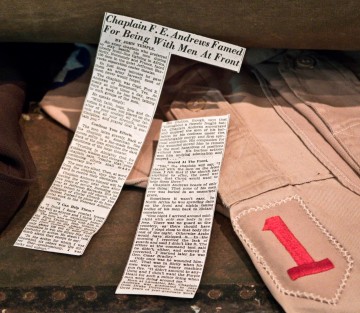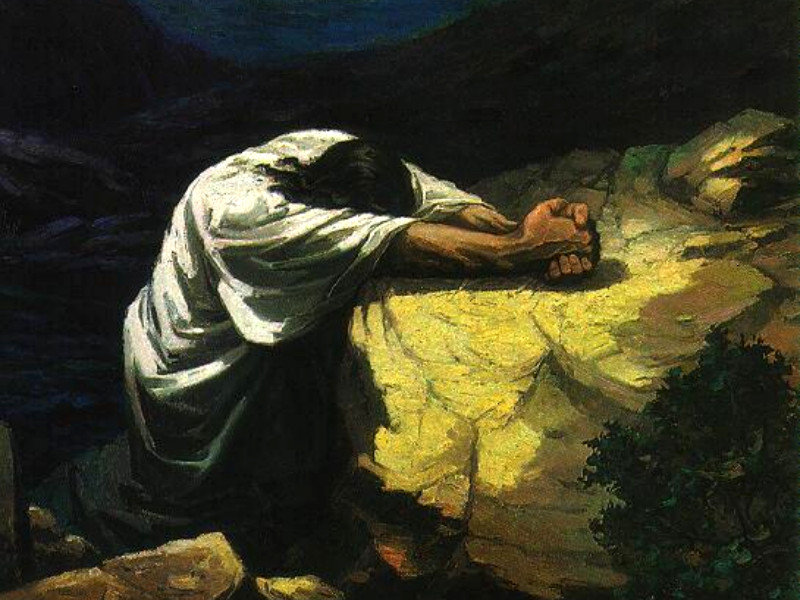The 1st Infantry Division was one of the D-Day assault teams on Omaha Beach. Seasick and chilled, they landed in knee deep water and were immediately under fire from four machine gun nests. Nearly a third of the men were killed in the first hour.
The following account of a chaplain from this division is transcribed from a newspaper clipping displayed in the Big Red One, 1st Infantry Division Assault Museum, located just minutes away from the American Cemetery at Omaha Beach in Normandy, France. The museum is curated by Pierre-Louis Gosselin, a local man who began collecting items to honor the 1st Division at when he was only nine years old. I do not know the date of the clipping, but it must be in the range of 1946-1949. Chaplain Andrews’ uniform is displayed, along with his Bible and other items pictured below.
By John Temple
An army chaplain who preferred to stay beside his men during bloody front-line fighting in Africa, Sicily, Normandy and France, faced 100 men in the quiet Jefferson Barracks separation center theater.
In just three minutes he gave them an army farewell most of them never would forget.
The chaplain was Capt. Fred E. Andrews of Beaumont, Tex. As many as nine times a day, seven days a week, he has been talking to such groups of the men.
He speaks simply:
“With faith, hope, love and determination to a cause, you placed on the altar of your country all your talents and all your strength, under discipline, and prayed God to sustain you.”
Continue Your Efforts
The men listen gravely. Back of the chaplain an American flag moves softly in a fan-made breeze. Back of the men stretches the dark emptiness of the large theater.
“Trusting in Almighty God for guidance, wisdom and strength,” the chaplain says, “resolve that all your continuing efforts shall make democracy live.”
The men are silent. Then, at a word from the chaplain, they step forward to receive their discharges.
Chaplain Andrews himself will be leaving the army next June after five years of service, including one year at Jefferson Barracks. But he won’t return to his old church, the Disciples of Christ Church of Des Moines. Instead he plans to do hospital work in the Veterans Administration.
“I Can Help Them.”
“I think I know combat troops as well as anyone and I think I can help them,” he explained today.
The men who served with him in the First Division, 26th Infantry will tell you he did plenty during two years overseas. He is one of only about 100 out of some 2,000 chaplains to win the Silver Star for gallantry in action. He doesn’t talk much about that except to say: “In the action for which I was decorated, six others won the Silver Star – posthumously. I was lucky and unhurt.”
His citation, though, says that “throughout a fiercely fought battle, Chaplain Andrew encouraged and inspired the men of his battalion by his coolness under fire, indefatigable energy, and firm spiritual conviction. His compassion for the wounded moved him to remain in the most hazardous of positions without fear. His fearless actions won him undying admiration and respect…”

Stayed At The Front
“Yes,” the chaplain will say, “I stayed with the men on the front lines. I felt that if the church had anything to offer, the need was there: that Christ would want to help them there.”
Chaplain Andrews boasts only of one thing: That none of his men was ever buried in an unmarked grave.
Sometimes it wasn’t easy. In North Africa he was spending days on the front and nights taking bodies of his men back to distant cemeteries.
“One night I arrived around midnight with only one body in my jeep. There was no guard at the cemetery, as there should have been. I slept close to that body the rest of the night. Otherwise Arabs would have stripped it. In the morning I reported the lack of guards and said I didn’t like it. The officer at the command tent said he didn’t, either, and ordered it corrected. I later learned he was Gen. Omar Bradley.”
Only once was he wounded himself. That was in Sicily when his men were under heavy machine gun fire. “It didn’t amount to anything and I didn’t want the Purple Heart for such a minor thing when men were dying around me.”
Born at Lancaster, Mo., Chaplain Andrews was graduated in 1933 from Drake University, then took three years of post-graduate work.
Categories: Growing in the Lord




Oh my, this brings me to tears. “I felt that if the church had anything to offer, the need was there: that Christ would want to help them there.” He made a decision that the world/war/chaos wasn’t revolving around him; instead, everything was about something bigger- Christ. I want to live that way.
LikeLike